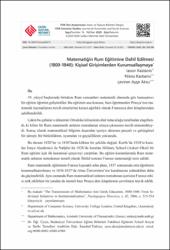Matematiğin Rum Eğitimine Dahil Edilmesi (1800-1840): Kişisel Girişimlerden Kurumsallaşmaya
Citation
KASTANIS, Iason & Nikolas, KASTANIS. "Matematiğin Rum Eğitimine Dahil Edilmesi (1800-1840): Kişisel Girişimlerden Kurumsallaşmaya." Çeviren, Ayşe Aksu . FSM İlmi Araştırmalar İnsan ve Toplum Bilimleri Dergisi, 16 (2020): 359-386.Abstract
19. yüzyıl başlarında birtakım Rum cemaatleri matematik alanında göz kamaştırıcı bir eğitim öğretim geliştirdiler. Bu eğitimin ana konusu, bazı öğretmenler Prusya’nın matematik kaynaklarını tercih etmelerine karşın ağırlıklı olarak Fransızca ders kitaplarından şekillendirildi. Lakin bu çabalar o dönemin Ortodoks kilisesinin dinî tutuculuğu tarafından engellendi, ki kilise bir Rum matematik anlatım metodunun ortaya çıkmasını tercih etmemekteydi. Sonuç olarak matematiksel bilginin dışarıdan içeriye aktarımı parçalı ve gelişigüzel bir süreçti; bir bütünlükten, uyumdan ve geçişlilikten yoksundu. Bu durum 1820’ler ve 1830’larda kökten bir şekilde değişti. Korfu’da 1824’te kurulan İonya Akademisi ile Nafplio’da 1828’de kurulan Military School (Askeri Okul) bir Rum eğitimi için ilk kurumsal çerçeveyi yarattılar. Bu eğitim kurumlarında Rum matematik anlatım metodunun temeli olarak İhtilal sonrası Fransız matematiği tesis edildi. Rum matematik eğitiminin Fransız kaynaklı arka planı, 1837 sonrasında orta öğretimin kurumsallaştırılması ve 1836-1837’de Atina Üniversitesi’nin kurulmasını müteakiben daha da güçlendirildi. Aynı zamanda Rum matematiksel anlatım metodunun içerisine Fransız etkisi zerk edilirken bir yandan da önemli bazı Prusya ders kitaplarının çevrilmesi teşvik edildi.19. yüzyılın ilk yarısı o dönemin epistemolojik eğilimlerinin, örneğin analitik model, Fransız matematikçilerinde hakim olan pozitivizm, Prusya matematiğinin tümleşik “paradigmasının” Rum matematik eğitiminin tarihsel oluşumuna aktarılmasına şahit oldu. In the early 19th century, a number of Greek communities developed a remarkable
education in mathematics. The subject matter for this instruction was drawn mainly from French textbooks, although some teachers displayed a preference for Prussian mathematical sources. These efforts, however, were thwarted by the religious conservatism of the Greek establishment of the time, which did not favor the emergence of a Greek mathematical discourse. As a consequence, the reception of mathematical knowledge was a fragmented, random process lacking cohesion, collectivity and transitivity. The situation radically changed during the second and third decades of the 19th century. The Ionian Academy in Corfu, and the Military School in Nafplio, founded in 1824 and 1828 respectively, created the first institutional frame for a Greek education in which post-revolutionary French mathematics was established as the basis of Greek mathematical discourse. The French background of Greek mathematical education was further reinforced after 1837, subsequent to the institutionalization of secondary education, and to the founding of the University of Athens in 1836-1837. At the same time, along with this French infusion into Greek mathematical discourse, some noteworthy translations of Prussian textbooks were promoted as well. The first half of the 19th century also witnessed the transmission of the respective epistemological trends of that era, i.e. of the analytical- model, of the positivism dominating French mathematics, and of the combinatorial “paradigm” of Prussian mathematics, to the historical setting of Greek mathematical education.



















